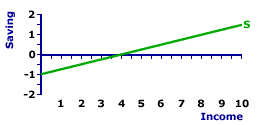
|
|
ARC ELASTICITY: The average elasticity for discrete changes in two variables, A and B. The distinguishing characteristic of arc elasticity is that percentage changes are calculated based on the average of the initial and ending values of each variable, rather than only initial values. Arc elasticity is generally calculated using the midpoint formula. Arc elasticity should be compared with point elasticity. For infinitesimally small changes in variables A and B, arc elasticity is the same as point elasticity.
Visit the GLOSS*arama
|
|


|

|
                           SAVING LINE: A graphical depiction of the relation between household sector saving and income. The saving line is closely related to the consumption line that forms one of the key building blocks for Keynesian economics. A saving line is characterized by vertical intercept, which indicates autonomous saving, and slope, which is the marginal propensity to save and indicates induced saving. The injections-leakages model used in Keynesian economics is based on the saving line. The saving',500,400)">saving line, also termed propensity-to-save line or saving function, shows the relation between saving and income for the household sector. The income measure commonly used is national income or disposable income. Occasionally a measure of aggregate production, such as gross domestic product, is used instead.The purpose of the saving line is to graphically illustrate the basic saving-income relation for the household sector, which is the foundation of the injections-leakages model used in Keynesian economics. Two basic types of saving are indicated by the saving line. Autonomous saving is the vertical intercept, or Y-intercept, of the saving line. Induced saving is the slope of the saving line. Of no small importance, the slope of the saving line is also the marginal propensity to save (MPS). | Saving Line | 
|
A representative saving line is presented in the exhibit to the right. This red line, labeled S in the exhibit is positively sloped, indicating that greater levels of income generate greater saving by the household sector. This positive relation corresponds to the fundamental psychological law of Keynesian economics.The two primary characteristics of the saving line are slope and intercept: - Slope: The slope of the saving line presented here is positive, but less than one. In fact, the slope of the saving line is numerically equal to the marginal propensity to save. In this case the slope is equal to 0.25. The positive slope reflects induced saving--more income means more saving. It also reflects the basic Keynesian psychological law. Click the [Slope] button to illustrate.
- Intercept: The saving line intersects the vertical axis at a value of -$1 trillion. This intersection indicates autonomous saving--saving unrelated to income. Autonomous saving is usually negative, indicating dissaving. This occurs because autonomous consumption is positive. Click the [Intercept] button to illustrate.
Note that the level of income (and production) generated by full employment of resources is NOT indicated in this exhibit. Full employment could correspond with $2 trillion of income or $20 trillion. There is no way of knowing. This is particularly important when injections-leakages model, used to identified equilibrium, is derived based on the saving line.

Recommended Citation:SAVING LINE, AmosWEB Encyclonomic WEB*pedia, http://www.AmosWEB.com, AmosWEB LLC, 2000-2025. [Accessed: July 18, 2025].
Check Out These Related Terms... | | | | | | | | | | | | |
Or For A Little Background... | | | | | | | | | |
And For Further Study... | | | | | | | | | | | | | | |
Search Again?
Back to the WEB*pedia
|



|

|
BLACK DISMALAPOD
[What's This?]
Today, you are likely to spend a great deal of time browsing about a thrift store seeking to buy either a genuine fake plastic Tiffany lamp or a microwave over that won't burn your popcorn. Be on the lookout for small children selling products door-to-door.
Your Complete Scope
This isn't me! What am I?
|

|
|
A lump of pure gold the size of a matchbox can be flattened into a sheet the size of a tennis court!
|

|
|
"A winner is someone who recognizes his God-given talents, works his tail off to develop them into skills, and uses those skills to accomplish his goals. " -- Larry Bird, basketball player
|

|
ATC
Average Total Cost
|

|
|
Tell us what you think about AmosWEB. Like what you see? Have suggestions for improvements? Let us know. Click the User Feedback link.
User Feedback
|


|


